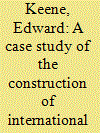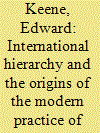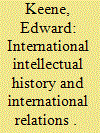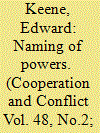|
|
|
Sort Order |
|
|
|
Items / Page
|
|
|
|
|
|
|
| Srl | Item |
| 1 |
ID:
077454


|
|
|
|
|
| Publication |
2007.
|
| Summary/Abstract |
This article evaluates different theories of hierarchy in international relations through a case study of the treaty system that the British constructed in the early nineteenth century in an effort to abolish the slave trade. The treaty system was extraordinarily wide-ranging: it embraced European maritime powers, new republics in the Americas, Muslim rulers in northern and eastern Africa, and "Native Chiefs" on the western coast of Africa. It therefore allows for a comparative analysis of the various types of treaty that the British made, depending on the identity of their contracting partners. The article argues that a broadly constructivist approach provides the best explanation of why these variations emerged. Although British treaty-making was influenced by the relative strength or weakness of the states with which they were dealing, the decisive factor that shaped the treaty system was a new legal doctrine that had emerged in the late eighteenth century, which combined a positivist theory of the importance of treaties as a source of international law with a distinction between the "family of civilized nations" and "barbarous peoples
|
|
|
|
|
|
|
|
|
|
|
|
|
|
|
|
| 2 |
ID:
124131


|
|
|
|
|
| Publication |
2013.
|
| Summary/Abstract |
This article argues that hierarchy plays an important role in shaping the practice of intervention, and that the changing nature of international hierarchy is a crucial part of the story of how the modern practice of intervention emerged. It describes the early modern order of precedence, and contends that it was ill-suited to encouraging people to recognise intervention as a distinctive kind of practice. However, over the course of the eighteenth century the structure of international hierarchy changed, with the emergence of a new kind of grading of powers, which provided the context for the development of a practice of intervention after 1815.
|
|
|
|
|
|
|
|
|
|
|
|
|
|
|
|
| 3 |
ID:
155791


|
|
|
|
|
| Summary/Abstract |
This article reviews contextualist methods in intellectual history and discusses some of the specific challenges involved in their application to the study of International Relations (IR) and hence international intellectual history. While the broad thrust of these developments has been highly positive, the article argues that a distinction between classic and lesser works is a crucial part of the apparatus of the contextualist approach, which poses a problem in IR, where the idea of an established canon of great works has historically been less well developed than in the study of Political Theory or Law. As a result, the move towards contextualist methods of interpretation can force authors to restrict their focus onto a newly conceived, and somewhat narrow, canon, with a strongly political and legal flavour. The eclectic range of earlier, albeit less methodologically sophisticated, histories offer considerable resources for defining the scope of new empirical enquiries in international intellectual history, and the article concentrates on early modern journalism as an example of this opportunity.
|
|
|
|
|
|
|
|
|
|
|
|
|
|
|
|
| 4 |
ID:
120740


|
|
|
|
|
| Publication |
2013.
|
| Summary/Abstract |
This article offers an historical examination of the evolution of the practice of representing international actors as 'powers', and the classification of them as different kinds of 'power'. It argues that the practice emerged in parallel with the use of the language of sovereign states, and points to the importance of the body of journalistic literature on the 'present state of Europe', to the development of the usage of the term 'powers' and associated ideas about 'interests' and 'pretentions', which it contrasts with the tendency within the body of juristic literature to focus on the 'rights' of 'sovereigns'. It also charts the contrary move in the discourse of powers towards a grading of different classes, whereas the tendency within the discourse of sovereigns was more towards equality, although the article also notes parallel elements of hierarchy within equality. The article concludes by asking how the 'normative power Europe' thesis fits with, but in some cases also departs from, these representational practices. For example, the idea is often used to convey the unique, sui generis nature of the EU's identity as an international actor, whereas the normal tendency within the discourse of powers is towards more generic and class-oriented forms of identity.
|
|
|
|
|
|
|
|
|
|
|
|
|
|
|
|
|
|
|
|
|